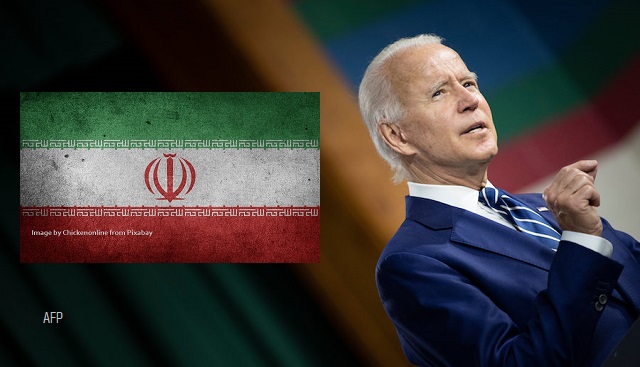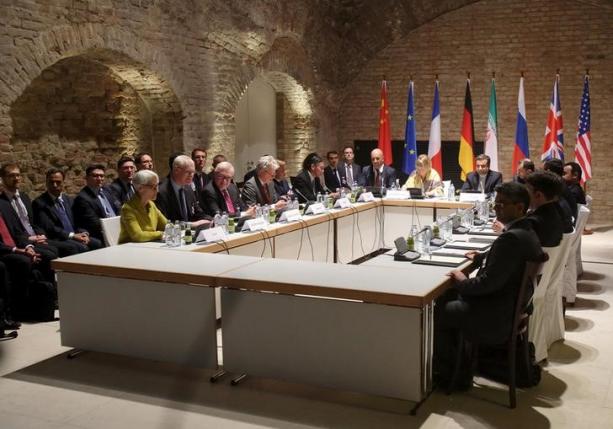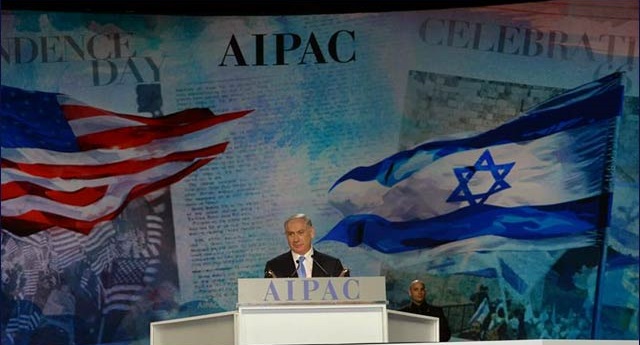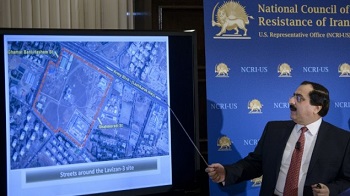An audience of 16,000 at the AIPAC Washington Policy Conference enthusiastically welcomed Israeli PM Netanyahu’s appearance, today. Netanyahu’s speech was a prelude to his appearance before a joint Session of Congress tomorrow at 10:45AM EST. It will be televised by Fox-News and C-SPAN. Fox will have commentary from a panel both prior to and following Netanyahu’s Congressional speech. The Voice of Israel will broadcast it live via the internet with following commentary.
Some likened today’s remarks as a warm up to the main event on Tuesday, March 3rd. For many of us his AIPAC Conference remarks today were punctuated by his eloquent Churchillian cadences. Other lines echoed Ze’ev Jabotinsky’s 1938 Tish B’Av “Ihr Kommt” (they’re coming) speech to Jews in Poland warning them of their impending destruction during Hitler’s Final Solution, the Holocaust. Other lines were reminiscent of Churchill’s caustic Parliamentary remarks on the Munich 1938 appeasement by Prime Minister Neville Chamberlain and French Premier Eduard Daladier acceding to Hitler’s demand that Czech President Eduard Benes unilaterally cede Sudetenland thus dismembering Czechoslovakia. All while Chamberlain waved that scrap of paper upon arrival at Heston aerodrome saying that he had achieved “peace for our times”. That imagery was captured in Netanyahu’s lavish praise heaped on Czech President Zeman who was on the dais at the AIPAC conference. Netanyahu thanked Zeman for the country’s enduring support for Zionism espoused by Czech Republic founder Thomas Masyrk and the material support the Czechs provided post WWII to Israel during the 1948-1949 War for Independence. That was captured in Netanyahu’s reference in his speech to the Czech rifle he trained with as an IDF Sayeret Matkal member.
Netanyahu paid copious respects to AIPAC officials, noted “no disrespect to President Obama”, and pledged fealty to the long enduring bi-partisan US relations with ally Israel. An Israel, as he pointed out, that shared common Western values of freedom, liberty, civil and human rights for the Jewish nation’s citizens. He noted as one example prominent women jurists on its High Court and as CEOs of Israeli companies.
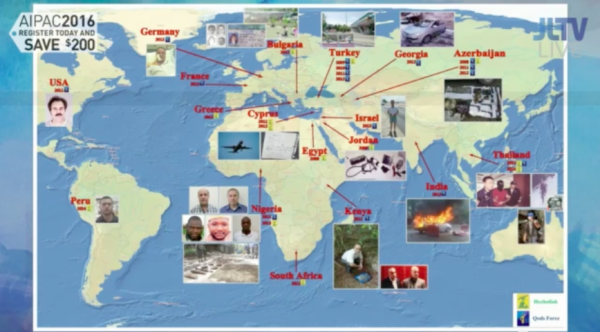
Screen shot of Global Map of Iran Terror used by PM Netanyahu at 2015 AIPAC. For a larger view click on the map.
He spoke clearly about why he was in Washington:
The purpose of my address to Congress tomorrow is to speak up about a potential deal with Iran that could threaten the survival of Israel. Iran is the foremost state sponsor of terrorism in the world. Look at that graph. Look at that map. And you see on the wall, it shows Iran training, arming, dispatching terrorists on five continents. Iran envelopes the entire world with its tentacles of terror. This is what Iran is doing now without nuclear weapons. Imagine what Iran would do with nuclear weapons.
And this same Iran vows to annihilate Israel. If it develops nuclear weapons, it would have the means to achieve that goal. We must not let that happen.
And as prime minister of Israel, I have a moral obligation to speak up in the face of these dangers while there’s still time to avert them. For 2,000 years, my people, the Jewish people, were stateless, defenseless, voiceless. We were utterly powerless against our enemies who swore to destroy us. We suffered relentless persecution and horrific attacks. We could never speak on our own behalf, and we could not defend ourselves.
Well, no more, no more.
The days when the Jewish people are passive in the face of threats to annihilate us, those days are over. Today in our sovereign state of Israel, we defend ourselves. And being able to defend ourselves, we ally with others, most importantly, the United States of America, to defend our common civilization against common threats.
In our part of the world and increasingly, in every part of the world, no one makes alliances with the weak. You seek out those who have strength, those who have resolve, those who have the determination to fight for themselves. That’s how alliances are formed.
Watch this C-span video of Israeli PM Netanyahu’s remarks at the 2015 AIPAC Conference.
U.S. UN Ambassador Power, speaking at AIPAC today, accorded respect for the enduring US-Israel alliance. She also said that the Administration would stop Iran from achieving a nuclear breakthrough:
The United States of America will not allow Iran to obtain a nuclear weapon, Period.
We believe diplomacy is the preferred route to secure our shared aim. But if diplomacy fails, we know the stakes of a nuclear-armed Iran as well as everyone here. We will not let it happen. There will never be a sunset on America’s commitment to Israel’s security. Never.
However, she tossed a barb at both Netanyahu and House Speaker Boehner for engaging in partisan politics with her remarks:
This partnership should never be politicized, and it cannot and will not be tarnished or broken. Debating the merits of a deal with Iran is legitimate. Politicizing that process is not. The stakes are too high for that.
For her appearance as an Administration senior official, she received a standing ovation from the 16,000 attendees at the Washington Convention Center site of the Conference.
Watch this C-Span video of US UN Ambassador Power’s remarks at the 2015 AIPAC conference.
More of the same followed from another Administration senior official, National Security Adviser Susan Rice, when she mounted the podium at the Walter E. Washington Convention Center to deliver her remarks. Rice appeared to be toeing the Administration line saying, “sound bites won’t stop Iran from getting a nuclear weapon.” Rice essentially denied the possibility of ending Iran’s nuclear enrichment saying:
[ getting Iran to] forego its domestic enrichment capacity entirely… as desirable as that would be … is neither realistic nor achievable. The plain fact is no one can make Iran unlearn the scientific and nuclear expertise it already possesses.
She cautioned that it wasn’t a “viable negotiating position” to attempt to block Iran from using its nuclear capacity for domestic energy reasons.
Now I want to be very clear: a bad deal is worse than no deal,
We have Israel’s back come hell or high water.
Given Iran’s support for terrorism, the risk of a nuclear arms race in the region, and the danger to the entire global non-proliferation regime, Iran with a nuclear weapon would not just be a threat to Israel, it’s also an unacceptable threat to the United States of America.
Given Iran’s support for terrorism, the risk of a nuclear arms race in the region, and the danger to the entire global non-proliferation regime, Iran with a nuclear weapon would not just be a threat to Israel, it’s also an unacceptable threat to the United States of America.
We have Israel’s back come hell or high water.
On sanctions, Rice made it abundantly clear why the Administration opposed any new legislation, saying:
We cannot let a totally unachievable ideal stand in the way of a good deal [with Iran]. Sanctions, have never stopped Iran from advancing its [nuclear] program. New sanctions would blow up the talks, divide the international community, and cause the U.S. to be blamed for causing negotiations with Iran to fail.
Not unlike Power, Rice received a standing ovation ironically for policies that she opposes. Note what blog Twitchy reported:
The highlight of her speech was undoubtedly the standing ovation she received for acknowledging the desire for a complete halt to Iran’s nuclear enrichment program. The look on her face while waiting for the cheers to die down so she could add “but” and finish her sentence: priceless.
Watch this You Tube video of the AIPAC audience applauding her and her befuddled expression:
That effectively shot down the faint hopes of many of the 16,000 in the Convention Center.
Senator Bob Menendez (D-NJ), co-author of the Nuclear Weapon Free Iran Act of 2015 with new sanctions, stormed up to the podium at AIPAC to rebut Rice. He said:
Iran needs to understand that there are consequences to an impasse and those consequences are additional consequential sanctions.
As long as I have an ounce of fight left in me… Iran will never have a pathway to a weapon.
It will never threaten Israel or its neighbors, and it will never be in a position to star a nuclear arms race in the Middle East. Not on my watch.
Secretary of State Kerry, speaking from Geneva, Switzerland earlier today in the midst of discussions with Iranian Foreign Minister Zarif, voiced concerns that ‘leaks’ by Israel might jeopardize the phased deal. Kerry said:
We are concerned by reports that suggest selective details of the ongoing negotiations will be discussed publicly in the coming days. Doing so would make it more difficult to reach the goal that Israel and others say they share in order to get to a good deal. Israel’s security is absolutely at the forefront of all of our minds, but frankly so is the security of all of the other countries in the region. So is our security.
Kerry made a brief appearance at the UN Human Rights Commission today in Geneva voicing concerns about the panel’s pre-occupation with isolating Israel, saying:
We will oppose any effort by any group or participant in the U.N. system to arbitrarily and regularly delegitimize or isolate, Israel. No country should be free from scrutiny on human rights, but no country should be subjected to unfair or unfounded bias.
President Obama in a Reuters interview several hours after Netanyahu’s speech at AIPAC expressed the view that the current discord would not seriously disrupt relations with Israel. Nevertheless he harshly criticized Netanyahu’s refrain about a bad deal emerging from the bi-lateral diplomatic discussions with Iran. He suggested the emerging 10 year deal with verifications was:
Far more effective in controlling their nuclear program than any military action we could take, any military action Israel could take and far more effective than sanctions will be.
He then took exception to Netanyahu’s criticism of the 2013 interim agreement with Iran:
Netanyahu made all sorts of claims. This was going to be a terrible deal. This was going to result in Iran getting $50 billion worth of relief. Iran would not abide by the agreement. None of that has come true. It has turned out that in fact, during this period we’ve seen Iran not advance its program. In many ways, it’s rolled back elements of its program.
Watch this video of the Reuters interview with President Obama on March 2, 2015.
The Administration still hasn’t fully understood the import of the Gallup poll of Americans, 84% of whom expressed distrust of Iran, while 77% believed Iran should be denied becoming a nuclear threshold state. As one audience member said at a presentation in Northwest Florida, Iran’s possession of a nuclear weapon was a threat not only to Israel, but America as well.
An expectant Israel and the world awaits Netanyahu’s address before a joint session of Congress tomorrow.
Listen to this Voice of Israel Sound Cloud of Netanyahu’s speech at AIPAC. The full text of Netanyahu’s AIPAC remarks can be found in this release by the Israeli Ministry of Foreign Affairs.
RELATED ARTICLE: Iran says it rejects Obama’s demand for 10-year nuclear work halt
EDITORS NOTE: This column originally appeared in the New English Review. The featured image is of Israeli Prime Minister Benyamin Netanyahu at AIPAC Washington Policy Conference taken on March 2, 2015. Source: GPO/Amos Ben Gershom.
